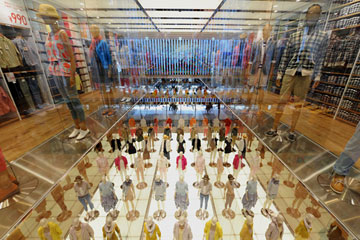
Uniqlo's flagship in Tokyo. The company aims to have 200 outlets in the U.S.
(4 of 4)
Yanai has even less patience with standard Japanese labor practices. In Japan's "salaryman" system, workers usually spend their entire careers at the first firm they join. Not so at Fast Retailing, which often hires people overlooked by other companies, such as workers switching jobs midcareer and those who have experience abroad. Uniqlo even has placed foreign nationals in senior positions, which is unusual for a Japanese company.
Not everyone regards Yanai as an enlightened employer. Japanese media have run stories saying his workers complain about long hours, exacting standards and high stress. Such reports have given Uniqlo a reputation as a "black company" that mistreats workers. Masahiro Watanabe, a journalist who has written extensively on the labor practices at Fast Retailing and other firms, says the way Yanai treats his staff is simply un-Japanese. "Traditional Japanese companies treat their employees as family," he says. "Uniqlo thinks employees are only parts and something replaceable."
Yanai is unsympathetic. Japanese workers, he says, "never work long hours. That's the problem." It's a symptom, he adds, of a larger malaise, which stems from Japan Inc.'s successes of the 1980s: "Japan got rich, then it got spoiled." If they don't change, there's a sign outside his office he'd like them to read.
